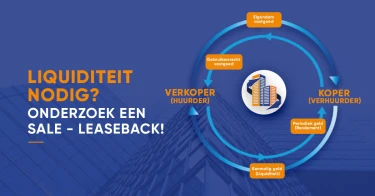
Need liquidity for your business?
Assets of businesses are often tied up in capital goods (buildings, machines, vehicles). Many entrepreneurs have assets, but you cannot use bricks to pay employees or suppliers. In a Sale - Leaseback, you sell your real estate and then lease it back from the buyer. The seller thus becomes the lessee and the buyer becomes the lessor.
More information?
Is a Sale and Leaseback suitable for any type of property?
Yes, it does not matter if you are the owner of an office building, a business complex or a retail property.
Our office is in contact with a variety of investors, ranging from local and regional investors. Investors who, for example, sold their own company and started investing, to large fund investors and institutional investors. Some investors focus on just one property category, for example specialising in logistics property. Other investors seek a spread between the different categories and consider every opportunity that comes along.
Why is my property attractive to buyers?
Investors who invest in real estate in order to make a profit want to limit risks where possible. If an investor acquires a building that is empty and free of rent, it can take a month, half a year or a year before a user comes forward. However, when that same investor buys your complex and you rent it back, there is no such vacancy risk.
Additionally, the quality of the building is a determining factor for buyers. Incidentally, this does not mean that only modern new buildings are amenable to sale - leaseback. Older buildings can also count on warm interest from investors. You could say that the buyer actually puts most of the focus on the contract than on the property.
When an investor is interested in my building, how does he/she then make a choice?
As mentioned, the investor will first and foremost check the quality of the tenant. An important second factor is the quality of the building. If there is a positive basic attitude to purchasing a location or building, the maximum price the buyer is willing to pay is linked to the rental price and the rental period that you agree on when renting. The periodic rent you pay to the buyer is his gross rental income.
The investor deducts from this the annual costs he has as owner of the complex (landlord maintenance, building insurance, municipal taxes, etc.) and then ends up with his net rental income.
The investor multiplies the net rental income by a factor that depends on his risk. The lower the risk, the lower the required return and the higher the payment factor. To determine the return requirement, the investor looks at other properties in his portfolio, but also at other investment categories such as shares, bonds, ships, art, whisky, etc.
How to start?
In order to be able to advise you properly, we would like to make an appointment at your company without any obligations to inspect the building/complex. During this visit, we would also like to exchange thoughts with you about your company and your business operations.
What are your expectations for the medium and long term? And what prospects do you see for your company and your sector? Depending on the complexity of your property, we can sometimes give you an estimate of the market rent and the related sales price on the spot. In many cases, further investigation of deeds, zoning plans and floor plans is needed first.
 nl
nl


